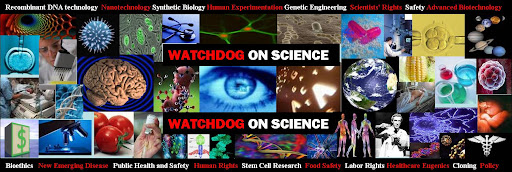Wednesday, July 28, 2010
Couric Brings Science and Ethics to Light
Katie Couric says we need to “find common ground between ethics and science, a compromise that everyone can live with and that might save lives”. Couric is right on. But her example into the bioethics of science is limited.
The ethics behind science is not limited to the ethical dilemma of using and funding human embryos for research. It has far reaching implications into other aspects of science.
Unfortunately these far-reaching implications are what the public does not quite yet understand. And it is dangerous ignorance.
Advanced technologies in nanotechnology, genetic engineering and synthetic biology are being developed and commercialized today at the expense of public health and safety. These technologies can also have dangerous and negative effects upon public. This is an ethical issue.
It is an ethical issue when science is advanced without appropriate risk assessment and safety protections for the public. It is an ethical issue when laws are made to prevent public transparency from understanding these issues or even preventing research into these safety aspects of advanced technologies. But it is happening today.
It doesn’t stop there. Ethics surrounding science is also about the loss of public rights with patenting of life, about scientists making profit off publically funded research, about conflicts of interests within academia, government and private industry which culminate into money making instead of life-saving research, about the public not having access to science publications that they fund, about how trade secrets supercede worker safety, public health and safety and human rights and about the lack of scientist’s rights to speak out regarding dangerous technologies that impact our health and society.
Ethical issues surrounding science are not being given adequate coverage in the media. And unfortunately when a scientific issue does get coverage, the coverage appears unbalanced, providing all the potential benefits of what science can offer, but then hardly ever providing the public a good understanding of the public safety and ethics involved.
Because the “ethical” issues underlying science are being put aside and even silenced in some cases, the public is slowly but surely losing more and more legal rights and human rights as technology advances. For example, we have lost the right to have our food properly labeled as genetically modified or not.
But the public should have the right to understand these ethical issues since they fund approximately $32 Billion dollars a year toward general biomedical research. That is a lot of money pulled from the taxpayer pocket.
Ethical issues related to science may not always be black or white. But they still deserve public transparency and debate since in some instance scientific technologies can create greater harm then good.
Couric is right in bringing to light the issue of balancing ethics and science. She is wrong, however, in limiting her ethical example to the embryonic stem cell, an issue that has historically been branded with divisiveness, extremism and propaganda, an issue that has caused a break in public awareness and adequate discussions in bioethics as a whole.
Nevertheless, Couric has to be acknowledged in hastening the public to be more aware of the importance of understanding the ethics behind science.
Subscribe to:
Post Comments (Atom)

No comments:
Post a Comment
POST COMMENT: